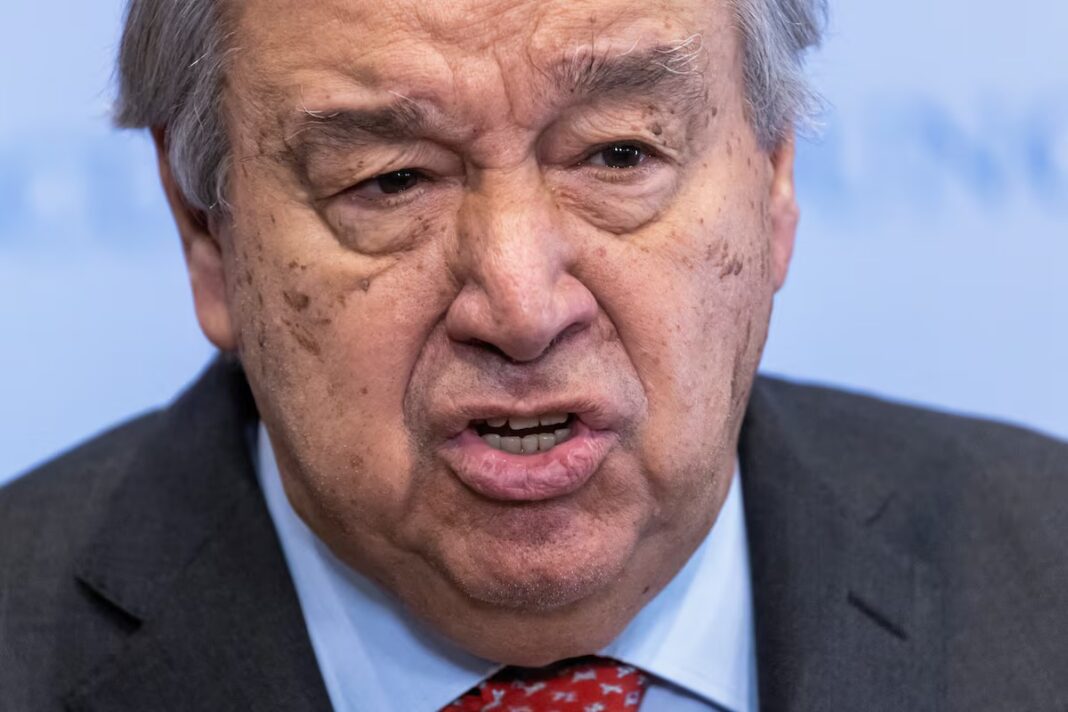UN Calls for International Law Compliance
United Nations Secretary-General Antonio Guterres has issued a stern warning to U.S. President Donald Trump regarding the situation in Gaza. His statement came after Trump proposed relocating Palestinians to other countries and allowing the U.S. to take control of Gaza. Guterres emphasized that any such action would violate international law and could be considered ethnic cleansing.
“In the search for solutions, we must not make the problem worse,” Guterres stated during a UN committee meeting. He stressed the importance of upholding international law and avoiding actions that could lead to permanent displacement of Gaza’s people.
Trump’s Controversial Plan Sparks Outrage
President Trump’s proposal has drawn sharp criticism from multiple international leaders. His plan suggests that Palestinians should resettle in neighboring countries such as Egypt or Jordan. While Trump argues that this would ensure their safety, Palestinian leaders see it as an attempt to remove them from their homeland permanently.
Israeli Intelligence Minister Gila Gamliel supported Trump’s idea, calling for “encouraging voluntary resettlement” of Palestinians from Gaza. Some Israeli officials have even suggested setting up tent cities in Egypt’s Sinai Desert to accommodate displaced Palestinians.
However, Palestinian leaders and international human rights organizations have condemned the proposal. They argue that forcing people out of Gaza would be a repeat of the 1948 Nakba, when hundreds of thousands of Palestinians were expelled from their homes during the creation of Israel.
Palestinians Reject Displacement
Palestinian United Nations envoy Riyad Mansour rejected Trump’s plan, stating, “We have no country except Palestine. Gaza is a precious part of it. We are not going to leave.” He emphasized that Palestinians want to rebuild Gaza and create a future there, rather than being pushed into exile.
Mansour also warned that Trump’s proposal could set a dangerous precedent. If the international community allows forced displacement in Gaza, similar actions could take place in other conflict zones around the world.
Arab States Stand Against Forced Relocation
Jordan’s King Abdullah is expected to visit Washington next week to deliver a joint message from Arab states rejecting Trump’s plan. Arab countries, including Egypt and Saudi Arabia, have repeatedly stated that they will not accept any forced movement of Palestinians into their territories.
Egypt has also made it clear that it will not open its borders to mass Palestinian migration. The Egyptian government fears that allowing refugees to enter would weaken Palestinian claims to their homeland and serve Israel’s long-term goal of emptying Gaza.
The Gaza War and Its Devastation
The war between Hamas and Israel, which began in October 2023, has left Gaza in ruins. The conflict displaced nearly 85% of the population, forcing them into overcrowded refugee camps. Cities and towns across the region have been reduced to rubble, with limited access to food, clean water, and medical supplies.
A ceasefire went into effect on January 19, 2025, providing temporary relief. However, the situation remains fragile, and many fear that Israel could resume its military operations if tensions rise again.
International Response and Legal Implications
The United Nations and human rights organizations have strongly opposed any forced removal of Palestinians. The Geneva Conventions prohibit the mass displacement of civilians, classifying it as a war crime. UN High Commissioner for Refugees Filippo Grandi stated that “evacuating a population should not be promoted, encouraged, or imposed.”
Guterres echoed these concerns, calling for a renewed commitment to the two-state solution. He emphasized that any long-term peace must involve an independent Palestinian state living alongside Israel.
What’s Next?
The coming weeks will be critical in determining the future of Gaza. Trump remains firm on his position, but global pressure is mounting against his proposal. The international community will be watching closely to see how the U.S., Israel, and Arab nations respond.
As diplomatic efforts continue, millions of displaced Palestinians are left in uncertainty, hoping for a peaceful resolution that allows them to return home rather than be forced into permanent exile.

